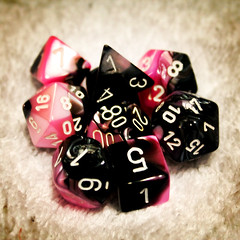 While trying to strike a balance between myself and what may someday be my players, in terms of responsibility, I asked my GM--who also happens to be my husband--what responsibility he felt players have in terms of pushing the game forward? I'm trying to feel my way through campaign design and it's tough to know when to stop planning.
While trying to strike a balance between myself and what may someday be my players, in terms of responsibility, I asked my GM--who also happens to be my husband--what responsibility he felt players have in terms of pushing the game forward? I'm trying to feel my way through campaign design and it's tough to know when to stop planning.Though I've been gaming with him for 14 years, and the answer should be obvious to me, it just isn't. It's never really come up. We work together to create a gaming experience we can both enjoy. He's the GM, but the weight has never been completely on his shoulders when I'm playing. I actively try to do things that make the game go.
But do all players?
The obvious answer here is no. Some players are content to be lead by the hand down the dark and scary path into the dark and scary dungeon. Some players are happy to work inside the confines of a completely linear story--which most modules happen to provide, step-by-step, no imagination required on the part of anyone. While I'm not one of them, I know plenty.
But what happens when you, as a GM, get a group that's part player's with initiative and part players who look for the linear path? He says, and I tend to agree, that the players with initiative will rise to the top and lead the group for everyone. But then my question becomes this: how much time can a player spend carrying his group along in terms of imagination? Well, there are certainly moments when any player has to think for themselves.
Take this for example:
I was GMing a classic-style "D&D evil campaign" that I had inherited--for a session or two--from another GM (my husband had begun it years ago, but had handed it off to me). Some of the players were imaginative in terms of playing to their alignments while other's had more trouble.
During the course of the game, the players were lead by some bad information to an abandoned Elven village high in the treetop canopy. They were way, way up off the ground when they realized that this place was not only empty, but that it was rigged to blow! Someone was trying to kill them all, which makes perfect sense because these are the kind of characters that have been making everyone's life a living hell. And who no one, not even the local guard can manage to get rid of.
So, I give them one action after making this realization to tell me what they intend to do to get away before they're rendered to ash or take so much falling damage that their "friends" will be scraping them up off the forest floor. I go clockwise around the room, because this really isn't an initiative situation, and give them about ten seconds to cough up an answer before I move on to the next player and they're opportunity is lost.
Every player in a group of four is able to give me a creative answer that will save their lives, and only their lives (most of the time abandoning their "friends" to save their own skin), except for one player. Rather than coming up with an answer, she used her life saving 10 seconds to ask me questions. They were mechanics questions, not really anything having to do with the setting, and eventually she lost her action and, subsequently, her character.
She simply couldn't come to a creative solution when she wasn't being lead by the other players, who were all in it for themselves at that point, as was befitting evil characters. In that case, it was her responsibility to help push her character forward, because there wasn't really any easy answer, and she didn't do it.
So then, we're back to my original point.
- What responsibility should players have to the game?
- Should it be the GM's responsibility, solely, to come up with solutions and push the game forward?
- When players do need to be lead, how can a GM show them--nicely--that they need to take the initiative (pun intended ) and help so that everyone can have the best time possible?
What do you think? Weight in on this one and let me know. I'm new to this whole GMing gig. :)


No comments:
Post a Comment